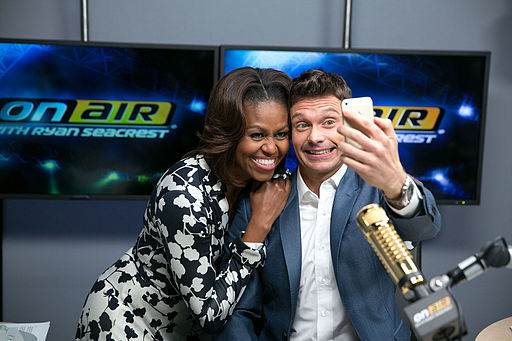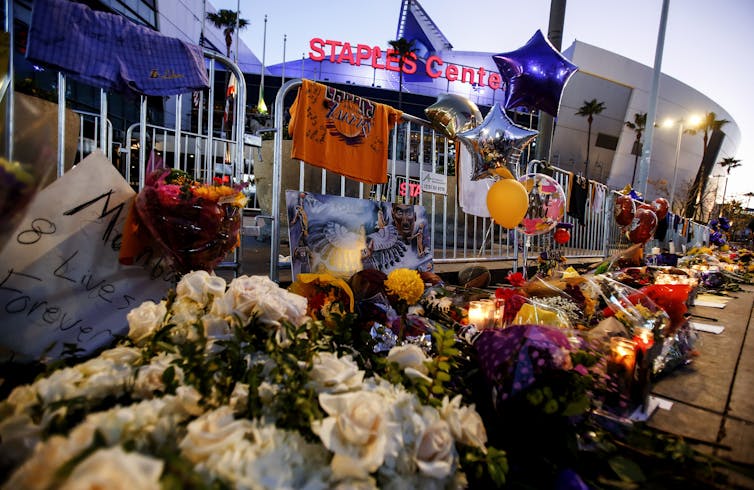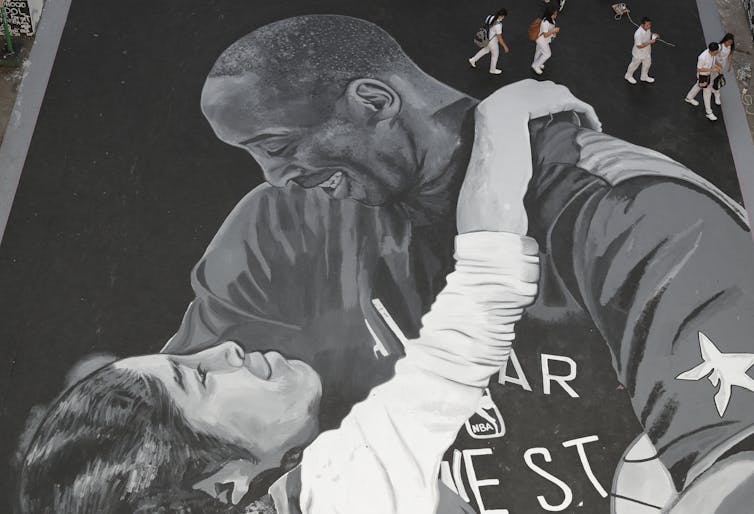9 Our Transformed Selves
Managing our publics like pros
In the world of mutual influence in which technologies and humans exist, are our selves changing? It would certainly appear so in an online search. Identity construction online is sophisticated and constant; not just a full-time job but an activity occupying all hours of our lives.
The need to manage our identities is a new phenomenon – right? Well, mostly. One culture that has been dealing with context collapse as an essential part of their work and lives is celebrity culture. And an increasingly popular strategy for pleasing multiple audiences in various contexts is to post like a celebrity.
Enter the phenomenon of microcelebrity, a way of presenting yourself like a celebrity: setting up your profile and “brand” online, gaining followers, and revealing things about yourself in strategic and controlled ways. The goal of microcelebrity is to make your brand – the marketing of yourself – valuable. The entire system around microcelebrity is called “the attention economy,” because with so much information out there vying for people’s attention, anything people choose to look at is perceived as more valuable, including ourselves. Microcelebrity leads social media users like you and I to apply marketing perspectives to our own identities.
Microcelebrity is big business. It can make ordinary people famous, as when Youtubers can become household names with lucrative marketing contracts. But more often, microcelebrity helps ordinary users participate in social media culture while managing their contexts with polish. We understand increasingly that our social media presences are like art exhibits of ourselves, and we spend extra time in curating them.
Solo Media: Posting for Yourself
Student Content, Fall 2020
Social media has become a major part of everyone’s daily life within the last 10 years. Being 20 years old, I grew up without smartphones being invented yet until I was probably 11 or 12 years old. Even then, it was limited in the number of apps that were at your personal disposal during this time. I remember the first-ever social media site that I ever belonged to was Facebook and I rarely used the app, simply just to say I had a profile on the site.
The next social media app that I was exposed to was Instagram, and Instagram really changed how social media sites worked in the future. It’s crazy how much the app has changed over the years, not just the format, but how people interact with the app as well as becoming Instagram models or even social media influencers. Social media was never really an important part of my life until I got to high school and then just because everyone else cared how they were portrayed on social media, then all of a sudden I had to care. I would post on my personal Snapchat story of the things that I was doing during the day to try and seem cool or popular. It could have been peer pressure or was I finally being dragged into the world of social media?
It wasn’t until I got to college that people do not care about the little things anymore. I started to develop this mindset and just realized that people do not care what you do during your day unless it personally impacts them. I also noticed that so many people want to become a social media influencer because they believe that they live their best lives. Little do most people realize is that social media is all based on what you want people to see unless you become famous and have people consistently watching over your back all the time. Most of the time social media influencers post pictures that show the good things in life, not the hardships.
In college social media is still very prevalent. From what I have witnessed it is more so used in Greek Life, than people not associated with Greek Life. For example, what I have noticed around Sorority girl’s Instagram pages is a similar theme to their own personal profile. Even with Fraternity guys, they each have their own personal theme to their page. Is this intentional or is it simply just the culture of being in Greek Life and having an Instagram account? I think it has something to do with that, many people don’t want to be different, they don’t want to stand out. There is nothing wrong with that, but why would you not want to be different? Being different is amazing because it brings out another side of the people that people are not used to seeing and people are generally curious.
I recently started taking up photography during quarantine and I have had a blast doing it because I found myself too really love it and share my perspective of the world with others on Instagram. I started posting on my main Instagram page and the love that I received was something that I was not expecting. I was expecting to get hate or just nothing at all, but people who truly care about you are going to show support no matter what you do. This is when it finally hit me that it doesn’t matter how many likes I get on pictures because at the end of the day I have shared what I think is truly beautiful and hopefully I can make somebody’s day better. Self-respect is a huge part of being able to finally let go of everyone’s opinion. It’s not about how much praise or recognition you get from others it is about how you feel about what you uploaded.
About the Author
I am an African American male who is a sophomore at the University of Arizona. I am an avid photographer and it is one of my passions / hobbies!!

Media theorist Alice Marwick has written about a paradox in microcelebrity: As ordinary people are acting more famous, famous people are acting more ordinary. Kim Kardashian presents a selfie of herself and Kanye West in a bathroom; Michelle Obama and Ryan Seacrest mug goofily for a selfie. Graeme Turner called this leveling of the everyday toward celebrity culture and vice versa "the demotic turn" in celebrity culture. “Celebrity culture is increasingly populated by unexceptional people who have become famous and by stars who have been made ordinary,” according to author Joshua Gamson.
Social media has accelerated the demotic turn in celebrity. Many people quote Andy Warhol’s comment in the past that each person, no matter how ordinary, would have 15 minutes of fame. Today, technologically connected societies offer a lifetime of potential discovery by audiences. High-profile celebrities perform the masses for the masses. And you all are superstars, to at least a small public.
How to be different on social media
Student Content, Fall 2020
Social media has and will continue to evolve and with that it will continue have a serious impact on not only my life but the lives of billions in this world. In my life I have decided to strive to have a different presence on social media, being constant in not necessarily posting or using this social media in terms of the “norm” by posting for desired attention or to prove how great my said life is. However, I post things that I care about and you can see in my media that there is a consistency in the media. With that I think what separates myself in a personal aspect of social media is that I have a unique story and perspective. I have something very much worth sharing. I would call this desired media. I have defined desired media as a source of media or media itself that wants the consumer wanting more and leaves them walking away feeling good. I believe personally most of my media is desired media in terms of it makes the consumer feel good, and especially those who know me well can relate with some of the media in their own lives as well, which can help contribute to that desired media.
In terms of being different on social media, many many people are trying to be “different” in order to receive fame and accolade for this, however, that is not what being different entails. I would say being different on social media means having a purposeful message and using it with a purpose. For example, using media to promote something you really care about. So in my instance I am an advocate for Phoenix Children’s Hospital and their Cancer and Blood Disorder branch. With that I help promote their fundraisers and then get their message out to those who may not be aware of what their goals are and the impact you can have. Speaking on impact, this can make someone feel good about using their media to better themselves and have an impact on the community.
In terms of the culture of social media, it is constantly changing and will continue to change. As we all see the rise of and fall of some social media for example, the ascension of TikTok and even the different cultures on that application in general. You have people and kids that are striving for fame and that is their only goal. Then you have the group that uses it just as something for fun, and that just uses it as a different use and change of pace from other medias. Culture is important when it comes to anything, a workplace culture is what builds that places character and is essential to each workplace. The same goes for social media applications and the use of them. In a world that is constantly finding ways to scrutinize individuals for their success, especially on social media, the culture of social media is something that if the culture is on the right track, so will social media for the most part, and it goes both ways. Overall, in terms of my social media I have learned that having a purpose in using, using it because you genuinely care, and work towards building a good culture are what separates myself in social media and can for you as well.
About the Author
I am a student at the University of Arizona and I am studying broadcast journalism and sports management.
Conclusion
Why is it important to know ourselves in order to understand social media? I called this book Humans are Social Media because the development of social media culture, including norms and technological affordances, is wrapped up in you, and me, and other humans. And we are also wrapped up in that culture; as we shape it, it shapes us.
I’ve tried to show the ways the partnership between social media technologies and human culture play out in this book. We began with the reverberations of this partnership on identity. We examined our society’s communication practices informing early social media technologies. We looked at how human-created algorithms bounce against human behaviors, reinforcing them but also sometimes being rejected by them. We learned about the ways humans have learned to use social technologies to seek what we want through online activism, branding, and lying. And we looked at the ways our bodies and needs for love play out in the digital landscape, performing new relationships and spectacular selves.
I hope this book has helped you to understand how important your role is as a human in a technological revolution.
And I hope that you will share what you’ve learned.
Core Questions
Question for Qualitative Thought:
Consider the branding practices on social media of yourself or a non-celebrity acquaintance you know. Compare these practices to an actual brand. Are the practices similar? How does it feel to brand oneself – what is emphasized, and what is left out?
Related Content
Why losing Kobe Bryant felt like losing a relative or friend (by Edward R. Hirt from The Conversation)

AP Photo/Ringo H.W. Chiu
Edward R. Hirt, Indiana University
On the afternoon of Jan. 26, I was at the Indiana men’s basketball game when a chorus of cellphones in the crowd pinged, alerting them to the news of Kobe Bryant’s death. I was astonished at how quickly fans’ attention switched from the game to utter shock and disbelief at the news of Bryant’s passing.
Soon, it seemed like the entire nation was in mourning.
Sure, we might expect the basketball world to grieve the passing of one of its all-time greats. But grief came from all corners. The Grammy Awards featured poignant tributes to Bryant. President Donald Trump and former President Barack Obama offered their condolences. People who had never met Bryant told reporters they felt like they had just lost a family member.
How can so many be so deeply affected by the death of someone they’ve never even met? Why might some people see Kobe Bryant as a family member?
As a social psychologist, I’m not surprised by these reactions. I see three main reasons, grounded in psychology, that explain why Bryant’s death had such a profound effect on so many people.
1. Feelings formed from afar
Psychologists Shira Gabriel and Melanie Green have written about how many of us form what are called “parasocial bonds” with other people. These tend to be one-way relationships with people whom we’ve never met or interacted with, but nonetheless feel intimately connected to.
Although ideas about parasocial bonds were first developed in the 1950s, they’ve garnered a lot of attention over the past couple of decades. For example, loyal fans of Oprah Winfrey and Ellen DeGeneres watch their shows almost every day, with the hosts actively trying to build a warm rapport with their viewers and their audience developing intense feelings of attachment.
But interest in parasocial relationships has exploded in the age of social media. People who follow celebrities on Twitter and Instagram get access to their relationships, emotions, opinions, triumphs and travails.
Even though it’s a one-way relationship – what are the chances a celebrity actually responds to a fan’s message on social media? – fans can feel a profound level of intimacy with the famous people they follow. Kobe Bryant, with over 15 million followers on Twitter and nearly 20 million followers on Instagram, clearly had a massive following.
2. The ‘what if’ factor
Still, there was something about Bryant’s death that seemed particularly tragic.
There’s no way to measure whether the outpouring of public grief surpassed that of recent celebrity deaths like Michael Jackson, Prince or Robin Williams. But it’s certainly possible that the unique circumstances surrounding Kobe Bryant’s death evoked stronger emotions.
Bryant died in a helicopter during extremely foggy conditions. This can lead to a lot of “what ifs,” otherwise known as “counterfactual thoughts.” Work by psychologists Daniel Kahneman and Amos Tversky has shown that when we can easily come up with ways to undo an outcome – say, “if it had been a clear day, Kobe would still be alive” – it can intensify the anger, sadness or frustration about a negative event. It makes the death seem that much more random – and make us feel like it never should have happened in the first place.
Furthermore, Bryant’s 13-year-old daughter, Gianna, died in the accident, along with seven others. This broadens Bryant’s identity beyond the basketball court, reminding people of his role as a father of four daughters – three of whom will now have to live without their sister and father.

AP Photo/Aaron Favila
3. It’s about us, not him
I’d also add that our grief over Kobe’s death may actually be less about him – and more about us.
According to “terror management theory,” reminders of our own mortality evoke an existential terror. In response, we search for ways to give our lives meaning and seek comfort and reassurance by connecting with loved ones. I found it striking that following the news of Bryant’s death, his former teammate Shaquille O’Neal said that he had called up several estranged friends in order to make amends. Bryant’s death was a stark reminder that life’s too short to hold onto petty grudges.
Similarly, after the loss of loved ones, we’ll often hear people suggest hugging those we love tightly, or living every day to the fullest.
Many had felt like they had gotten to know Bryant after watching him play basketball on TV for 20 years. His death was random and tragic, reminding us that we, too, will someday die – and making us wonder what we’ll have to show for our lives.
Edward R. Hirt, Professor of Psychological and Brain Sciences, Indiana University
This article is republished from The Conversation under a Creative Commons license. Read the original article.
Thanks for reading Humans Are Social Media. We’d love to hear from you!
Media Attributions
- GI1_image_5fced83481088 © Anonymous adapted by Emily Gammons is licensed under a CC BY (Attribution) license
- First_Lady_Michelle_Obama_and_Ryan_Seacrest_selfie_Jan_2014 © The White House is licensed under a Public Domain license
- SC_image-5fceba50d37a5 © Anonymous adapted by Emily Gammons is licensed under a CC BY (Attribution) license
a way of presenting yourself like a celebrity: setting up your profile and "brand" online, gaining followers, and revealing things about yourself in strategic and controlled ways
Graeme Turner's term for the leveling of the everyday toward celebrity culture and vice versa (Understanding Celebrity, 2004)

